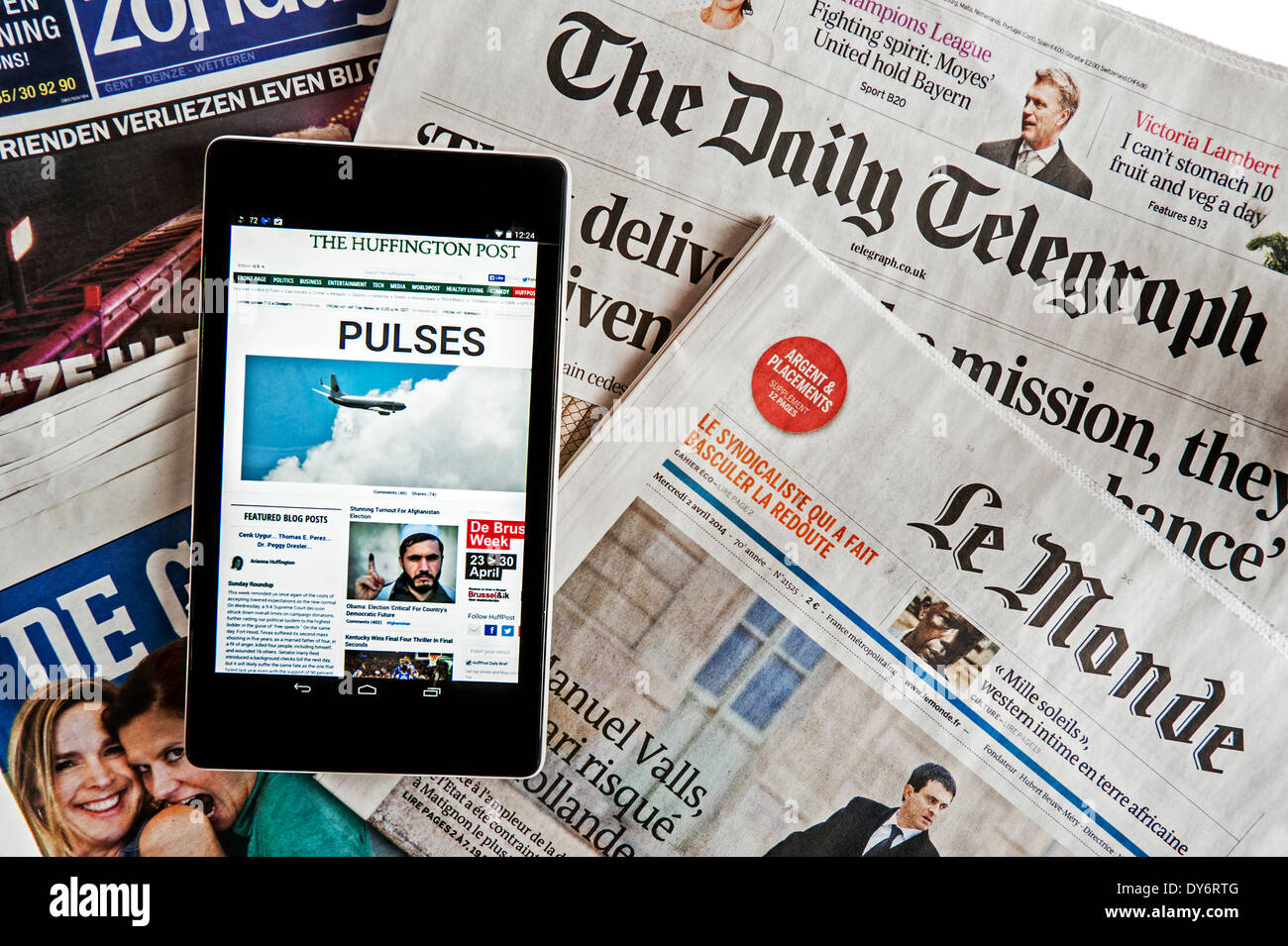Ways to Customize Your stnews.live Experience
Wiki Article
The Importance of Fact-Checking worldwide of News Online
The occurrence of misinformation in today's online news landscape has reached startling degrees. Fact-checking organizations play an important duty in counteracting this trend. They verify cases and boost the trustworthiness of journalism. The performance of these companies commonly hinges on their methodologies and public perception. As target markets browse this intricate setting, the effects of their findings may form the future of news usage and depend on. What does this mean for the integrity of details moving on?
The Increase of Misinformation in the Digital Age
How has the introduction of electronic technology added to the spread of false information? The quick growth of the net and social networks platforms has actually helped with the circulation of details at an extraordinary pace. Individuals can share short articles, videos, and opinions with a simple click, often without verifying the material's precision. Algorithms focus on thrilling or psychologically billed material, resulting in a proliferation of deceptive narratives that catch interest.In addition, the privacy paid for by electronic systems permits people to spread false details without liability (stnews.live). False information prospers in echo chambers, where customers are subjected largely to point of views that strengthen their beliefs, even more setting frauds. The saturation of details can bewilder users, making it testing to determine reputable sources from undependable ones. Consequently, misinformation has become a prevalent problem in the electronic landscape, affecting popular opinion and count on legitimate news resources
The Duty of Fact-Checking Organizations
Fact-checking organizations play a crucial function in boosting the reputation of journalism by validating insurance claims made in news reports. Their efforts are important in combating false information, guaranteeing that accurate info prevails in the electronic landscape. By holding media outlets responsible, these companies contribute considerably to educated public discussion.Enhancing Integrity in Journalism
While misinformation multiplies in the digital age, fact-checking organizations play a crucial duty in boosting the reliability of journalism. These companies carefully confirm claims made in news short articles, public statements, and social networks posts, guaranteeing that info disseminated to the public is accurate and reliable. By giving independent assessments, they function as an important resource for reporters, aiding them keep high standards of honesty. Furthermore, their initiatives advertise transparency in media, cultivating public depend on. As audiences end up being progressively critical, the visibility of respectable fact-checking entities can differentiate reliable news sources from those that might spread frauds. Eventually, the dedication of fact-checking companies to maintain truthfulness is crucial for the health of democratic discussion.Combating False Information Successfully
As false information remains to spread out rapidly throughout digital systems, the duty of fact-checking companies becomes significantly critical in the battle for accurate information. These organizations function as watchdogs, looking at claims made by public figures and media outlets to assure liability. By employing rigorous research approaches and professional evaluation, they verify truths and clear up misleading narratives. Their findings are distributed via various networks, enlightening the general public and fostering vital reasoning. Additionally, partnerships with social media sites platforms boost their reach, permitting prompt flagging of incorrect details. As digital literacy grows, the impact of fact-checking organizations is important in equipping audiences to discern fact from fraud, ultimately contributing to an extra enlightened society.How Misinformation Affects Public Assumption
Misinformation significantly undermines rely on media, leading audiences to question the reputation of news resources. Because of this, individuals frequently gravitate towards outlets that strengthen their current beliefs, adding to the polarization of viewpoints. This dynamic creates a fragmented info landscape, where shared recognizing comes to be increasingly difficult to achieve.Rely on Media

Count on media has come to be significantly fragile in the digital age, where the quick spread of false info can alter public perception. As false information multiplies across social networks and on the internet systems, target markets frequently find it testing to discern qualified sources from unstable ones. This uncertainty promotes skepticism, leading numerous individuals to question the objectives behind news reporting. Count on in developed media outlets has diminished, as customers significantly transform to alternate sources that might do not have extensive content requirements. This disintegration of depend on not only impacts individual ideas yet likewise threatens the cumulative capability to participate in educated conversations. Inevitably, the honesty of journalism is at risk, highlighting the essential requirement for reliable fact-checking to recover self-confidence in the media landscape.

Polarization of Viewpoints
The raising apprehension towards conventional media has added to a growing polarization of opinions among the public. False information, commonly shared with social networks and on the internet platforms, plays a considerable role fit distinct ideological splits. Individuals frequently look for info that lines up with their pre-existing beliefs, enhancing their perspectives while dismissing opposing point of views. This echo chamber impact escalates divisions, causing a fragmented public discourse where consensus ends up being significantly elusive. Furthermore, sensationalized narratives prosper in this atmosphere, better skewing public assumption and cultivating question in legitimate resources. As polarization rises, the need for effective fact-checking comes to be extremely important to bridge gaps and promote notified conversations, inevitably making certain an extra natural culture capable of maneuvering complicated problems.Strategies for Effective Fact-Checking
Reliable fact-checking depends on a methodical technique that consists of detailed research study, verification of sources, and critical evaluation of insurance claims. A foundational strategy is cross-referencing details from multiple credible sources to verify its precision. Fact-checkers commonly make use of specialized data sources and archives to trace the beginning of certain statements, making certain that the reported info straightens with recorded proof.An additional essential technique involves scrutinizing the context in which cases exist. Misleading information can occur from out-of-context quotations or selective data use. By examining the broader narrative, fact-checkers can recognize possible prejudices or misconceptions.
In addition, involving with experts in pertinent areas can give clarity and understanding that improves the fact-checking procedure. This cooperation can reveal nuances that laypeople might ignore - stnews.live. Ultimately, a disciplined method incorporating these methods cultivates a more informed public, enhancing the dependability of information shared in the digital age
The Influence of Social Network on News Intake
Just how has social networks transformed the means people eat news? The development of systems like Facebook, Twitter, and Instagram has notably modified news usage patterns. News is now disseminated rapidly, permitting individuals to gain access to real-time updates and involve with material through sort, shares, and remarks. This immediacy has actually cultivated a preference for bite-sized information, usually at the expense of in-depth analysis.Moreover, social media sites allows individualized news feeds, where algorithms curate material based upon individual see this page choices, producing resemble chambers that may restrict exposure to diverse perspectives. The duty of traditional news outlets has decreased as individuals significantly rely upon peer recommendations and trending subjects. The credibility of details is typically compromised, as sensationalism can outweigh accurate reporting. Overall, social media sites has improved news usage, stressing rate and personalization while testing the requirements of journalistic integrity.
Encouraging Target Markets to Determine Reliable Sources

Furthermore, analyzing the authorship and business background of newspaper article can expose potential predispositions. Cross-referencing info across numerous trusted outlets further improves the verification procedure. Making use of electronic tools, such as web browser expansions that rank the reputation of websites, can additionally aid in recognizing reliable info. By actively involving with these resources and cultivating a vital frame of mind, target markets can better outfit themselves to recognize dependable find more info news sources, ultimately fostering an extra educated culture in the middle of the complexities of today's media setting.
The Future of Journalism and Fact-Checking
As the media landscape evolves, the future of journalism and fact-checking deals with both tests and chances. The surge of digital platforms has equalized details dissemination, enabling diverse voices to emerge. Nevertheless, this has actually also caused the spreading of false information, necessitating robust fact-checking mechanisms. Reporters will progressively depend on technology, consisting of AI devices, to verify truths rapidly and successfully.Cooperation in between wire service and fact-checking entities is prepared for to enhance integrity and transparency. Audience involvement will certainly play a vital function, as educated visitors end up being substantial companions in determining trustworthy material.
The need for responsibility and accuracy is most likely to expand, pushing reporters to maintain high requirements in their coverage. Inevitably, the future of journalism might depend upon its ability to adjust to technical innovations while preserving journalistic honesty, guaranteeing that fact-checking stays a keystone of legitimate news.
Frequently Asked Questions
Exactly How Can I Report Misinformation I Run Into Online?
To report false information encountered online, people can make use of platform-specific coverage tools, provide clear evidence, and share the info with fact-checking companies. Engaging with community conversations can also aid elevate understanding regarding the false information.What Prevail Indicators of False Information in News Articles?
Common indicators of misinformation in newspaper article include spectacular headings, absence of reputable resources, psychological language, inconsistent realities, and absence of author qualifications. Visitors should seriously examine web content for these indications to determine accuracy.How Do Fact-Checkers Validate Resources?
Fact-checkers validate resources by her comment is here cross-referencing information with legitimate data sources, speaking with experts, and examining the initial context of claims. They likewise assess the dependability of the sources, making certain accurate and trustworthy details for public usage.What Lawsuits Can Be Taken Against False information?
Lawsuits versus misinformation may consist of defamation claims, cease-and-desist orders, and regulative charges. Targets can prosecute with civil courts, while some jurisdictions impose penalties or assents on platforms distributing incorrect information.Exist Apps for Fact-Checking News On-The-Go?
Numerous applications exist for fact-checking news on-the-go, including Snopes, FactCheck.org, and PolitiFact. These applications aid customers confirm cases rapidly, advertising notified decision-making and promoting a much more critical approach to consuming news in real-time.Report this wiki page